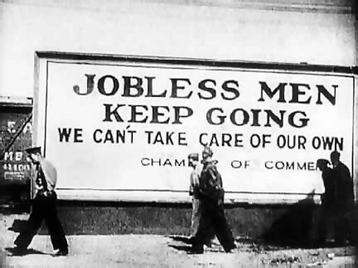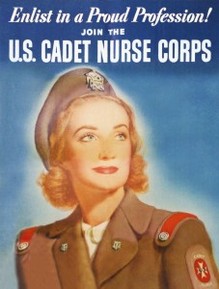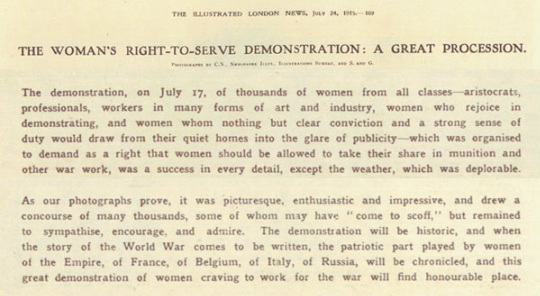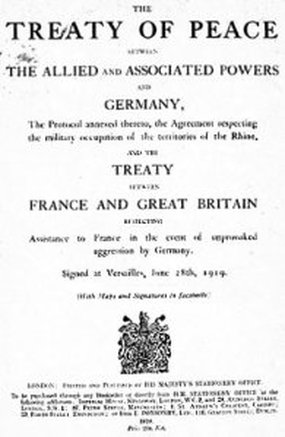Big Gist
By: Jazmin Haque
The Women's MovementWorld War I had lasted from August 1914 and ended in November 1918. It had caused for many large changes in society and had signaled a turning point for one group in particular, women. Women’s roles in employment and voting had changed tremendously after WWI in both Europe and the United States.
War had caused for Europe’s nation to reach into their labor pool in order to build up their military. Many of the men had been casualties of the war and were away serving for their countries. This had in effect caused for the need of new workers at home. These newly vacant jobs were then filled by women and African Americans in the United States. Women were then able to work in factories rather than just being housewives. In the factories, women were able to produce a variety of goods from military arms and ammunition to common household goods. However, women were not able to just work, they were able to work at jobs that they were not able to work at before. These include heavy industry, military suppliers, and police work. Their wages had been lower compared to men but they were now able to be employed more often than before the war. This was a turning point for women because they were now able to sustain and support their families without their husbands. In addition, women had also been seen as nurses in the armed forces and the front lines. In the United States more than 30,000 women had worked in the military, mainly as nurses, in World War 1. Women had also worked to support the French military but they had worked a variety of positions rather than just nursing. However, the French government had refused to recognize their contributions as military services. Women had been also used in propaganda as recruiters for the WWI after the war had started. Posters had been promoted to men with the message that soldiers were needed to defend women, children, and the soldier’s homeland. For example, a poster that was displayed in Ireland featured a woman standing with a rifle outside of a burning Belgium that read, “Will you go or must I?”. They were taught to “persuade” men into joining the Army. In many cases, young and beautiful women were presented on posters as a reward for brave soldiers. Due to the war and propaganda, women had been seen as the symbols of the country and were representations of their nations. Both Britain and France had characters which were known as Britannia and Marianne. These new positions for women in the workforce and in propaganda had allowed for the independence of women to be established and promoted. These leaps had caused for more respect from politicians and later had helped to gain women’s equality. Women’s voting rights had expanded both after the war or at the end of the war in many nations. Russia in 1917, Germany in 1918, and later the United States in 1919. Women in France and Italy were forced to wait until 1945 until they were able to gain the right to vote. |
The Great Depression

Employment rates were at record lows during the Great Depression.
The Great Depression had been an “economic slump” in the United States, Europe, and other industrialized nations in the world. It had lasted from 1929 to 1939 and was known as the longest and most severe depression of the industrialized Western world.
While the United States economy had slumped from 6 months before the stock-market crashes on the New York Stock Exchange in October of 1929, it still marked the beginning of the United States Depression. This in combination with the failure of 11,000 banks by 1933 had caused for reduced levels in spending and had helped with the economy’s downward spiral. This had then created lower manufacturing output and a higher unemployment rate to 12-15 million workers.
While it started in the United States, the Great Depression soon turned to Europe due to the relationships that had been created between their economies in World War 1. Europe’s economies had been damaged and weakened by the war by war debts in defeated nations. The countries that had been most indebted to the United States because of the war (Germany and Great Britain) were hit the hardest by the Great Depression. In order to protect production in their nations, almost all nations had imposed and raised tariffs and create many restrictive measurements that would reduce international trade. The reduction of international trade had also been a major contributor to the Great Depression because it did not allow for the United States or Europe’s economies to be stimulated as much as they had before.
First Inaugural Address: Franklin D. Roosevelt, March 4, 1933
In such a spirit on my part and on yours we face our common difficulties. They concern, thank God, only material things. Values have shrunken to fantastic levels; taxes have risen; our ability to pay has fallen; government of all kinds is faced by serious curtailment of income; the means of exchange are frozen in the currents of trade; the withered leaves of industrial enterprise lie on every side; farmers find no markets for their produce; the savings of many years in thousands of families are gone.
More important, a host of unemployed citizens face the grim problem of existence, and an equally great number toil with little return. Only a foolish optimist can deny the dark realities of the moment.
Franklin's inaugural address had mentioned the difficulties and impact of the Great Depression on people and the nation as seen in the excerpt above.
While the United States economy had slumped from 6 months before the stock-market crashes on the New York Stock Exchange in October of 1929, it still marked the beginning of the United States Depression. This in combination with the failure of 11,000 banks by 1933 had caused for reduced levels in spending and had helped with the economy’s downward spiral. This had then created lower manufacturing output and a higher unemployment rate to 12-15 million workers.
While it started in the United States, the Great Depression soon turned to Europe due to the relationships that had been created between their economies in World War 1. Europe’s economies had been damaged and weakened by the war by war debts in defeated nations. The countries that had been most indebted to the United States because of the war (Germany and Great Britain) were hit the hardest by the Great Depression. In order to protect production in their nations, almost all nations had imposed and raised tariffs and create many restrictive measurements that would reduce international trade. The reduction of international trade had also been a major contributor to the Great Depression because it did not allow for the United States or Europe’s economies to be stimulated as much as they had before.
First Inaugural Address: Franklin D. Roosevelt, March 4, 1933
In such a spirit on my part and on yours we face our common difficulties. They concern, thank God, only material things. Values have shrunken to fantastic levels; taxes have risen; our ability to pay has fallen; government of all kinds is faced by serious curtailment of income; the means of exchange are frozen in the currents of trade; the withered leaves of industrial enterprise lie on every side; farmers find no markets for their produce; the savings of many years in thousands of families are gone.
More important, a host of unemployed citizens face the grim problem of existence, and an equally great number toil with little return. Only a foolish optimist can deny the dark realities of the moment.
Franklin's inaugural address had mentioned the difficulties and impact of the Great Depression on people and the nation as seen in the excerpt above.
Origins of World War II: Europe Vs AsiaWorld War II origins in Europe were mainly due to the Treaty of Versailles. This treaty had ended World War I and had placed full blame of the war on Germany and Austria Hungary, set war reparations, and had set more conditions that would limit Germany’s power. It had also caused for resentment and mistrust of Germany’s new government, the Weimar Republic, to the United States. Germany had then found it’s economy majorly damaged due to the high war reparations and an unstable government. The Great Depression had then further crippled the German economy. These unstable conditions had led the rise in power of Adolf Hitler. Hitler had thought of it as his responsibility to defy the Treaty of Versailles and all of its charges against Germany. He was able to rebuild the nation’s army, re-militarize Rhineland, and prepare itself for war. The war in Europe had had started with the German invasion of Poland on September 1, 1939 which had been led by Hitler although he had been told that he was not allowed to take over neighboring countries by Britain and France. War had then been declared on Germany september 3, 1939.
World War II origins in Asia had been similar to Europe in retrospect that they were both due to power struggles. Japan had been seen as a colonial power after World War I due to it being such a valuable ally to the United States in World War I. This status had led to the rise of nationalist leader who had demanded more natural resources to support Japan’s extensive industrial growth. With the Great Depression affecting the world, Japan had moved to a fascist system with an army exerting influence over its government and emperor. In order to keep their economy growing they were forced to place a large emphasis on their arms and weapons productions. Most of their materials had come from the United States which had caused for a dependence on foreign materials. In order to prevent this any further, Japan had sought out other colonies to add to their existing possessions in Korea. They had then looked towards China for more expansion. Japan had invaded Manchuria on September 18, 1931. The League of Nations had passed a resolution that demanded the withdrawal of their troops, however, they refused to withdraw. In January, the United States then stated that they would not recognize any new governments formed by Japanese aggression, the League of Nations had soon after agreed with the United States and prompted for Japan to leave the League of Nations in 1933. For the next few years Japan would continue to expand by aggression against the will of the United States and League of Nations. These origins were all seen to be prompted by Japan’s wish to expand and gain more power than was deemed necessary by the rest of the world, similar to Germany. |
Works Cited:
"Causes of World War I." Wikipedia. Wikimedia Foundation, 05 Apr. 2013. Web. 05 May 2013. <http://en.wikipedia.org/wiki/Causes_of_World_War_I>.
"Firstworldwar.com." First World War.com. N.p., n.d. Web. 05 May 2013. <http://www.firstworldwar.com/features/womenww1_three.htm>.
"Imperial Japan." - World War 2 on History. N.p., n.d. Web. 05 May 2013. <http://www.history.co.uk/explore-history/ww2/imperial-japan.html>.
"Causes Of World War 1" American History.com. N.p., n.d. Web. 05 May 2013. <http://americanhistory.about.com/od/worldwari/tp/causes-of-world-war-1.htm>.
"Manhattan Project" Wikipedia. N.p., n.d. Web. 05 May 2013. <http://en.wikipedia.org/wiki/Manhattan_Project>.
"World War II Europe Causes." Military History.com. N.p., n.d. Web. 05 May 2013. <http://militaryhistory.about.com/od/worldwarii/a/wwiieurcauses.htm>.
"Great Depression" English.Illinois. N.p., n.d. Web. 05 May 2013. <http://www.english.illinois.edu/maps/depression/about.htm>.
"Women in World War 1." About.com European History. N.p., n.d. Web. 05 May 2013. <http://europeanhistory.about.com/od/worldwar1/a/ww1women.htm>.
"World War II Pacific: Moving Towards War." About.com Military History. N.p., n.d. Web. 05 May 2013. <http://militaryhistory.about.com/od/worldwarii/a/wwiipaccauses_2.htm>.
"Firstworldwar.com." First World War.com. N.p., n.d. Web. 05 May 2013. <http://www.firstworldwar.com/features/womenww1_three.htm>.
"Imperial Japan." - World War 2 on History. N.p., n.d. Web. 05 May 2013. <http://www.history.co.uk/explore-history/ww2/imperial-japan.html>.
"Causes Of World War 1" American History.com. N.p., n.d. Web. 05 May 2013. <http://americanhistory.about.com/od/worldwari/tp/causes-of-world-war-1.htm>.
"Manhattan Project" Wikipedia. N.p., n.d. Web. 05 May 2013. <http://en.wikipedia.org/wiki/Manhattan_Project>.
"World War II Europe Causes." Military History.com. N.p., n.d. Web. 05 May 2013. <http://militaryhistory.about.com/od/worldwarii/a/wwiieurcauses.htm>.
"Great Depression" English.Illinois. N.p., n.d. Web. 05 May 2013. <http://www.english.illinois.edu/maps/depression/about.htm>.
"Women in World War 1." About.com European History. N.p., n.d. Web. 05 May 2013. <http://europeanhistory.about.com/od/worldwar1/a/ww1women.htm>.
"World War II Pacific: Moving Towards War." About.com Military History. N.p., n.d. Web. 05 May 2013. <http://militaryhistory.about.com/od/worldwarii/a/wwiipaccauses_2.htm>.



